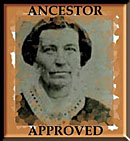Ancestor Approved Award
 I was recently nominated for an Ancestor Approved Award by three of my fellow genealogists, Annie Barnes at Hibbitt Family History Blog, Kerry Farmer at Family History Research and Judy Webster at Genie Leftovers. I was very honoured to have been nominated for this award, by three separate individuals, especially as I am a relative newcomer to the world of genealogy blogging.
I was recently nominated for an Ancestor Approved Award by three of my fellow genealogists, Annie Barnes at Hibbitt Family History Blog, Kerry Farmer at Family History Research and Judy Webster at Genie Leftovers. I was very honoured to have been nominated for this award, by three separate individuals, especially as I am a relative newcomer to the world of genealogy blogging.This award was created by Leslie Ann Ballou of the Ancestors Live Here blog. Recipients are asked to list ten surprising, humbling or enlightening aspects of their research and to then pass the award on to ten other genealogy researchers or bloggers.
I'm afraid it has taken me a little while to get around to this, but here goes!
Firstly, here is my list of surprising, humbling or enlightening aspects of my research:
- A continual surprise to me is how many of my ancestors ended up living "in sin", whereas in my generation we were brought up to believe that the Victorians were all so straight laced!
- I was very surprised to discover that my gg grandfather, Edward Clifford (see separate blog post) had been a Professor of Mathematics, and suspect this is where my interest in Mathematics came from.
- When I talk to friends and acquaitances about my interest in genealogy, I am surprised at how many of them would like to know more about their own family history and yet have done nothing about it.
- One of my earliest genealogy discoveries was that a recent family of five sisters were all illegitimate. The biggest surprise was that the girls themselves didn't appear to know they had several half-siblings!
- At the start of my research, I was very humbled to meet other, more experienced researchers who were more than happy to share the fruits of their hard labour. I immediately warmed to the generosity shown by the family history community.
- On the flip side of this generosity was my experience of a certain genealogy networking site (no points for guessing which), where, for some reason, many of the users seem more concerned with growing the size of their trees, rather than checking the data they add in.
- I have also found it rather humbling to discover just how many of my ancestors struggled with their daily existence, losing many of their children to death and disease and often living in humble abodes.
- My own family history research took a huge leap forward once I tapped into the valuable parish register indices on what was previously called the IGI. The enlightenment came when I learnt to distinguish between the user-added records and the references to transcribed records - obvious when you know!
- Another enlighhtenment has been discovering the wide range of trades and professions undertaken by my ancestors, many of which no longer exist. Trades such as bookbinders, sail makers, tanners, boot makers and even cattle drovers, were, I guess, all respectable occupations in their day.
- Finally, I have been pleasantly surprised to find so many of my ancestors originating in London. This is one of the reasons behind me setting up this blog, to share my experience of researching this sometimes tricky area!
In return I would like to present this award to the following genealogy and history researchers and bloggers:
- Luke at Kith and Kin Research and Dorset Heritage
- Chris at Scottish GENES (GEnealogy News and EventS)
- Kirsty at The Professional Descendant
- Emma at Diary of an Urban Genealogist
- Rosamunde at Tracing Ancestors in the UK
- Melanie at The House Historian
- Mike at Genealogy Gazette
- Audrey at The Family Recorder
- Elyse at Elyse's Genealogy Blog
- Paul at Out of Battle
Rosemary Morgan
London Roots Research